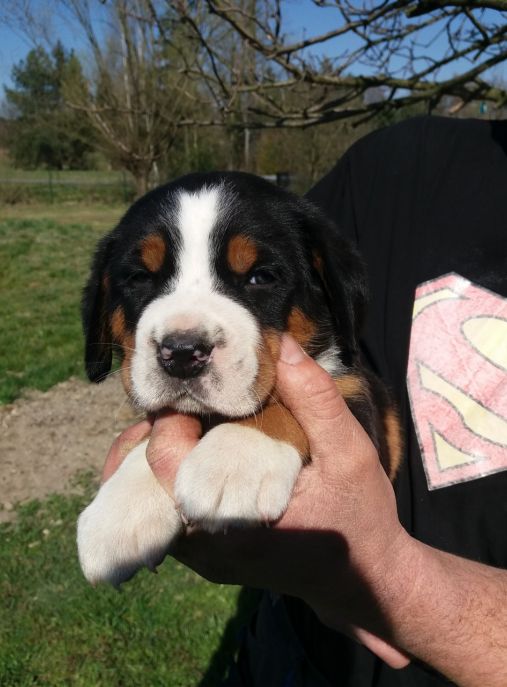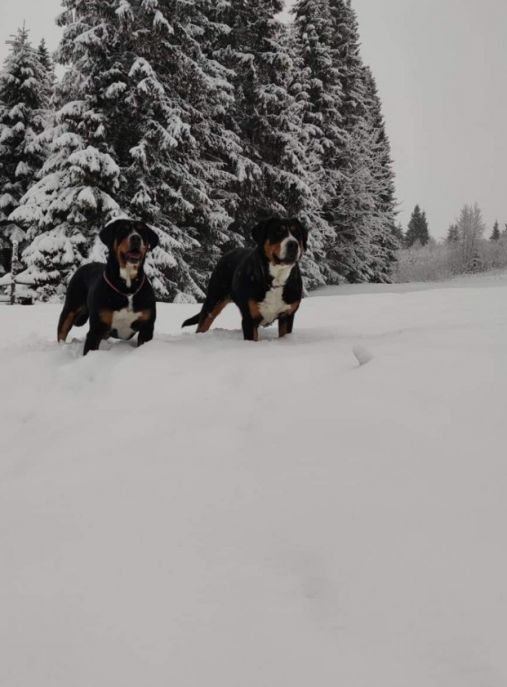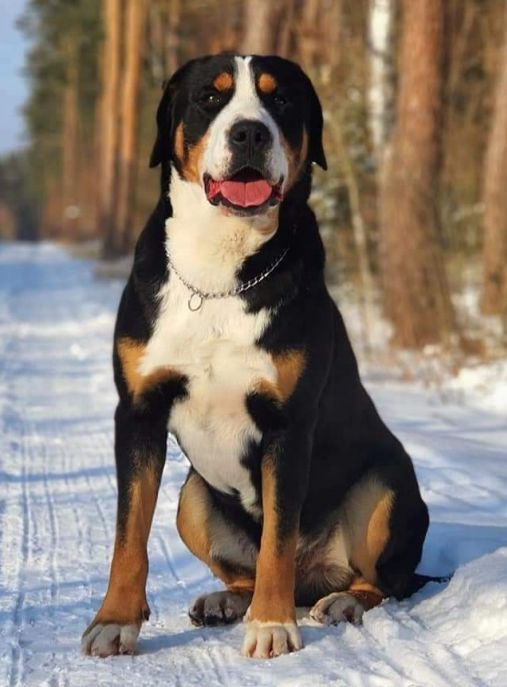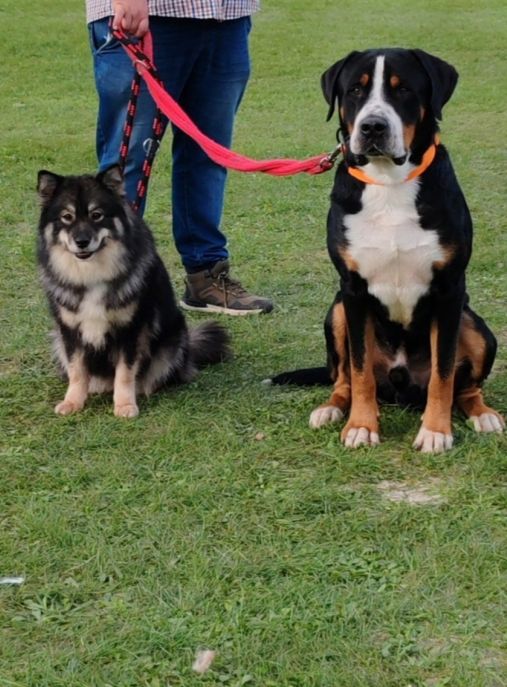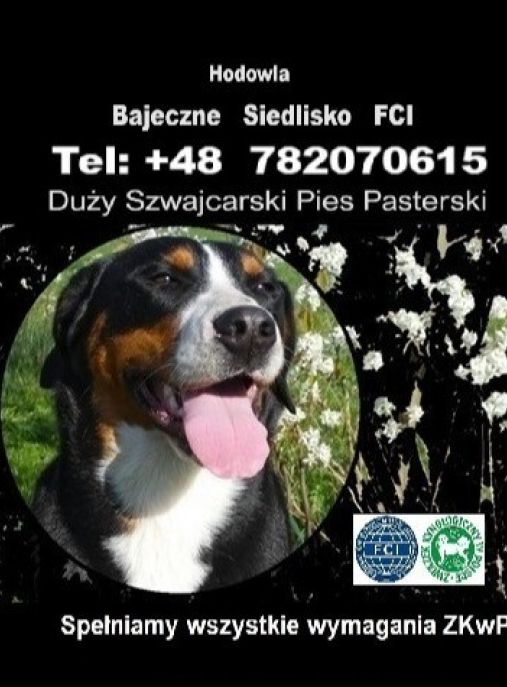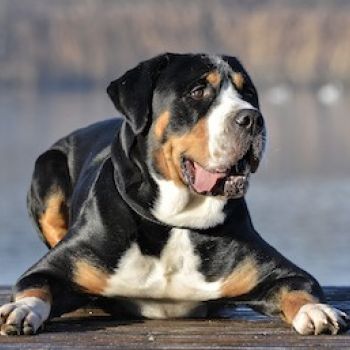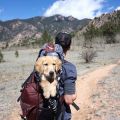The Great Swiss Mountain Dog, also known as the Grosser Schweizer Sennenhund, is a majestic and powerful breed that hails from the Swiss Alps. With its striking appearance and gentle nature, this breed has gained popularity not only as a working dog but also as a beloved family companion. In this comprehensive text, we will delve into the history, characteristics, and unique qualities of the Great Swiss Mountain Dog.
Originating in Switzerland, the Great Swiss Mountain Dog is one of the four Sennenhund breeds, which are all named after the Swiss Alpine dairymen known as Senn. These dogs were primarily used as working dogs, assisting the Senn in herding cattle, pulling carts, and guarding their families and livestock. The breed's history can be traced back to the Roman era, where they were believed to have descended from the Molossus dogs brought by the Romans to the Swiss Alps.
According to the FCI (Fédération Cynologique Internationale) typology, the Great Swiss Mountain Dog belongs to Group 2: Pinscher and Schnauzer - Molossoid breeds - Swiss Mountain and Cattle Dogs. This group includes other breeds such as the Bernese Mountain Dog, Appenzeller Sennenhund, and Entlebucher Mountain Dog. These breeds share common characteristics, including a robust build, strong work ethic, and loyalty to their families.
The Great Swiss Mountain Dog is a versatile breed that excels in various roles. They are renowned for their exceptional herding abilities and were often used to drive cattle to and from the pastures. Their strength and endurance make them excellent draft dogs, capable of pulling heavy loads with ease. Additionally, their gentle and affectionate nature has made them popular as therapy dogs, providing comfort and companionship to those in need.
In terms of physical characteristics, the Great Swiss Mountain Dog is a large and muscular breed. Males typically stand between 25.5 to 28.5 inches (65-72 cm) at the shoulder, while females are slightly smaller, ranging from 23.5 to 27 inches (60-68 cm). The breed's weight ranges from 110 to 140 pounds (50-64 kg) for males and 85 to 110 pounds (38-50 kg) for females. Their size and strength make them an imposing presence, yet their friendly and gentle demeanor sets them apart.
One notable feature of the Great Swiss Mountain Dog is their distinctive tri-color coat. The breed's dense double coat consists of a black base with rich rust and white markings. Their coat is weather-resistant, allowing them to withstand the harsh Alpine climate. Regular brushing is necessary to maintain their coat's health and prevent matting.
With regards to their temperament, the Great Swiss Mountain Dog is known for its calm and composed nature. They are incredibly loyal and devoted to their families, making them excellent companions and guardians. While they are generally friendly and gentle, they can be reserved with strangers, displaying a natural protective instinct. Early socialization and training are crucial to ensure they develop into well-rounded and confident dogs.
In terms of health, the Great Swiss Mountain Dog is generally a robust breed with a life expectancy of around 8 to 11 years. However, like many large breeds, they are prone to certain health issues, including hip and elbow dysplasia, bloat, and certain genetic conditions. Responsible breeders conduct health screenings and genetic testing to minimize the risk of these conditions and ensure the overall health of the breed.
Despite their size, the Great Swiss Mountain Dog is well-suited for various living situations. They can adapt to apartment living as long as they receive sufficient exercise and mental stimulation. However, they thrive in homes with ample space and a secure yard where they can roam and play freely. Regular exercise, including daily walks and playtime, is essential to keep them physically and mentally stimulated.
In conclusion, the Great Swiss Mountain Dog is a magnificent breed with a rich history and remarkable qualities. Their strength, loyalty, and gentle nature make them excellent working dogs, therapy dogs, and family companions. Whether herding cattle, pulling carts, or providing comfort, this breed's versatility and loving disposition have endeared them to dog enthusiasts worldwide.
The Great Swiss Mountain Dog, also known as the Grosser Schweizer Sennenhund, is a majestic and gentle giant that possesses a character as impressive as its physical appearance. This breed is renowned for its loyalty, intelligence, and calm demeanor, making it an excellent companion and working dog. In this text, we will delve into the character of Great Swiss Mountain Dogs, their behavior, and how to raise and train them.
One of the defining characteristics of the Great Swiss Mountain Dog is its unwavering loyalty. These dogs form deep bonds with their families and are known to be fiercely protective. They are incredibly devoted and will go to great lengths to ensure the safety and well-being of their loved ones. This loyalty extends beyond their immediate family, as they are also known to be friendly and accepting of strangers when properly socialized.
Despite their large size, Great Swiss Mountain Dogs have a gentle and calm demeanor. They are known for their patience and tolerance, especially with children. These dogs are excellent with kids and are often referred to as "gentle giants." They have a natural instinct to be gentle and protective around young ones, making them an ideal family pet.
Great Swiss Mountain Dogs are intelligent and eager to please, which makes them highly trainable. They thrive on positive reinforcement and respond well to consistent and patient training methods. Early socialization and obedience training are crucial for this breed to ensure they grow into well-rounded and well-behaved adults. They are quick learners and excel in various dog sports, such as obedience, agility, and tracking.
When it comes to their behavior, Great Swiss Mountain Dogs are generally calm and composed. They are not prone to excessive barking or destructive behavior, making them suitable for apartment living, provided they receive sufficient exercise. However, being a working breed, they have a moderate to high energy level and require regular physical and mental stimulation. Daily walks, playtime, and interactive toys are essential to keep them happy and content.
Great Swiss Mountain Dogs are known for their adaptability and can thrive in various living environments. They are equally comfortable in urban settings or rural areas, as long as they receive the attention and exercise they require. However, due to their large size, they need ample space to move around comfortably.
When raising a Great Swiss Mountain Dog, it is crucial to provide them with early socialization. Expose them to different people, animals, and environments to ensure they grow up to be confident and well-adjusted adults. Additionally, consistent and positive reinforcement-based training is essential to establish boundaries and reinforce good behavior.
In conclusion, the Great Swiss Mountain Dog is a remarkable breed with a character as impressive as its physical stature. Their loyalty, intelligence, and calm demeanor make them excellent family pets and working dogs. With proper socialization, training, and care, these gentle giants will bring joy, love, and companionship to any household lucky enough to have them.
The Great Swiss Mountain Dog, also known as the Grosser Schweizer Sennenhund, is a majestic and powerful breed that requires specific care to ensure their well-being. Here are some tips on how to properly care for Great Swiss Mountain Dogs, including what to do and what not to do:
1. Exercise: Great Swiss Mountain Dogs are active and energetic, so regular exercise is crucial. Aim for at least 30-60 minutes of daily exercise, including walks, runs, and playtime. However, avoid excessive exercise during their growth phase to prevent joint problems.
2. Grooming: These dogs have a dense double coat that requires regular brushing to prevent matting and remove loose hair. Brush them at least once a week, and during shedding seasons, increase it to two or three times a week. Bathing should be done as needed, using a dog-specific shampoo.
3. Nutrition: Provide a balanced and nutritious diet to maintain their overall health. Feed them high-quality dog food that meets their specific needs, considering their age, size, and activity level. Avoid overfeeding to prevent obesity, which can lead to joint issues.
4. Health care: Regular veterinary check-ups are essential to monitor their health and prevent any potential issues. Vaccinations, deworming, and flea/tick prevention should be done as recommended by your veterinarian. Additionally, consider spaying or neutering your Great Swiss Mountain Dog to prevent unwanted pregnancies and certain health problems.
5. Training and socialization: Start training and socializing your Great Swiss Mountain Dog from an early age. They are intelligent and eager to please, making them relatively easy to train. Use positive reinforcement techniques, such as treats and praise, to encourage good behavior. Socialize them with other dogs, animals, and people to ensure they grow up to be well-rounded and friendly companions.
6. Mental stimulation: These dogs thrive on mental stimulation, so provide them with interactive toys, puzzles, and games to keep their minds engaged. Engaging in activities like obedience training, agility, or tracking can also provide mental stimulation while strengthening the bond between you and your dog.
7. Environment: Great Swiss Mountain Dogs are adaptable to various living situations, but they require a spacious and secure environment. A securely fenced yard is ideal, as they have a natural instinct to roam and explore. Ensure they have access to shade and fresh water, especially during hot weather.
8. Avoid overexertion: While these dogs are strong and robust, they are prone to certain health issues, including hip and elbow dysplasia. Avoid activities that put excessive strain on their joints, such as jumping from heights or running on hard surfaces. Provide them with comfortable bedding to support their joints and prevent pressure sores.
9. Avoid extreme temperatures: Great Swiss Mountain Dogs have a thick coat that provides insulation, but they can still be sensitive to extreme temperatures. During hot weather, provide them with shade, fresh water, and avoid exercising them during the hottest parts of the day. In cold weather, provide them with a warm and sheltered area, and consider using doggy coats or sweaters to keep them comfortable during walks.
10. Emotional well-being: These dogs are known for their loyalty and affectionate nature. They thrive on human companionship and can suffer from separation anxiety if left alone for long periods. Ensure they receive plenty of love, attention, and mental stimulation to keep them happy and emotionally balanced.
Remember, every dog is unique, and individual care requirements may vary. It's important to consult with your veterinarian and breed-specific resources for personalized advice on caring for your Great Swiss Mountain Dog.
The Great Swiss Mountain Dog, also known as the Grosser Schweizer Sennenhund, is a majestic and powerful breed that boasts a striking coat color. The common color of Great Swiss Mountain Dog dogs is a rich and deep black with vibrant rust-colored markings.
The base color of their coat is a solid black, which covers the majority of their body. This black hue is intense and lustrous, giving the dog a regal and commanding presence. The black coloration is evenly distributed throughout their body, from the top of their head to the tip of their tail.
What truly sets the Great Swiss Mountain Dog apart is the stunning rust-colored markings that adorn their coat. These markings are typically found on specific areas of their body, creating a beautiful contrast against the black background. The rust-colored markings are most commonly seen on their cheeks, above their eyes, on their chest, and on their legs.
The rust markings are a warm and deep shade of reddish-brown, resembling the color of autumn leaves. They are well-defined and sharply contrast against the black base color, creating a striking and eye-catching appearance. These markings add a touch of elegance and sophistication to the overall look of the Great Swiss Mountain Dog.
In addition to their black base color and rust markings, some Great Swiss Mountain Dogs may also have white markings on their chest, paws, and tail tip. These white patches are not as common as the black and rust coloration but can further enhance the dog's overall appearance.
The coat of the Great Swiss Mountain Dog is dense, thick, and weather-resistant, providing them with excellent protection against harsh climates. This double coat consists of a dense undercoat and a longer, coarser outer coat. The combination of these two layers gives the dog a robust and sturdy appearance.
The coloration of the Great Swiss Mountain Dog's coat not only adds to their visual appeal but also serves a practical purpose. The black color helps to absorb sunlight, keeping them warm in colder temperatures. The rust markings, on the other hand, are believed to have a symbolic meaning, representing the dog's connection to their Swiss heritage.
In conclusion, the common color of Great Swiss Mountain Dog dogs is a stunning combination of a solid black base coat with vibrant rust-colored markings. This coloration, along with their robust build and noble demeanor, makes them a truly remarkable and visually striking breed.
The Great Swiss Mountain Dog, also known as the Swissy, is a large and robust breed known for its strength, loyalty, and gentle nature. When it comes to their health, Swissies are generally considered to be a healthy breed with a few common health issues to be aware of. Proper care and regular veterinary check-ups are essential to ensure the well-being of these magnificent dogs.
One of the most common health concerns in Great Swiss Mountain Dogs is hip and elbow dysplasia. This is a hereditary condition where the hip or elbow joint does not develop properly, leading to pain, lameness, and arthritis. Regular screening for dysplasia through X-rays is recommended before breeding to minimize the risk of passing on this condition. Additionally, maintaining a healthy weight and avoiding excessive exercise during the growing stage can help reduce the likelihood of developing dysplasia.
Another health issue that can affect Swissies is bloat, also known as gastric dilatation-volvulus (GDV). This is a life-threatening condition where the stomach fills with gas and twists, cutting off blood supply to vital organs. Bloat can occur suddenly and requires immediate veterinary attention. To minimize the risk of bloat, it is recommended to feed multiple small meals throughout the day, avoid vigorous exercise immediately after meals, and use elevated feeding bowls.
Epilepsy is another condition that can affect Great Swiss Mountain Dogs. Epileptic seizures can range from mild to severe and may require lifelong management with medication. If you suspect your Swissy is experiencing seizures, it is crucial to consult with a veterinarian for proper diagnosis and treatment.
Like many large breeds, Swissies are prone to certain types of cancer, including osteosarcoma (bone cancer) and hemangiosarcoma (a type of cancer that affects blood vessels). Regular veterinary check-ups and early detection are crucial in managing these conditions. Additionally, maintaining a healthy diet, providing regular exercise, and avoiding exposure to environmental toxins can help reduce the risk of cancer.
To care for the overall health of a Great Swiss Mountain Dog, a balanced diet is essential. Feeding a high-quality dog food that meets their nutritional needs is crucial for their growth and development. Regular exercise is also important to keep them physically fit and mentally stimulated. Daily walks, playtime, and activities that challenge their intelligence are recommended.
Regular grooming is necessary to maintain the Swissy's coat and overall hygiene. Their dense double coat requires brushing at least once a week to prevent matting and remove loose hair. Additionally, regular dental care, including brushing their teeth and providing dental chews, can help prevent dental diseases.
Routine veterinary check-ups are vital to monitor the health of Great Swiss Mountain Dogs. Vaccinations, parasite prevention, and regular screenings for common health issues should be part of their healthcare regimen. Early detection and prompt treatment can significantly improve the prognosis for any potential health concerns.
In conclusion, while Great Swiss Mountain Dogs are generally a healthy breed, they are prone to a few common health issues such as hip and elbow dysplasia, bloat, epilepsy, and certain types of cancer. By providing proper care, including a balanced diet, regular exercise, grooming, and routine veterinary check-ups, you can ensure the overall health and well-being of these magnificent dogs.
The Great Swiss Mountain Dog, also known as the Grosser Schweizer Sennenhund, is a large and powerful breed that requires a well-balanced and nutritious diet to support its active lifestyle and maintain optimal health. Proper nutrition plays a crucial role in the overall well-being of these dogs, ensuring they have the energy, strength, and vitality they need to thrive.
When it comes to feeding a Great Swiss Mountain Dog, it is essential to provide them with high-quality dog food that meets their specific nutritional requirements. Here are some key considerations and advice on how to feed and what to avoid when it comes to this breed's nutrition:
1. Balanced Diet: A balanced diet is crucial for the Great Swiss Mountain Dog's overall health. It should consist of a combination of high-quality commercial dog food and fresh, whole foods. Look for dog food that is specifically formulated for large breeds or active dogs, as they require more calories and nutrients.
2. Protein: Protein is an essential component of a dog's diet, especially for a large and muscular breed like the Great Swiss Mountain Dog. Ensure that the dog food you choose contains a high-quality source of animal protein, such as chicken, beef, or fish. Aim for a minimum of 18-22% protein content in their diet.
3. Healthy Fats: Healthy fats are an excellent source of energy for dogs and help support their skin and coat health. Look for dog food that includes sources of omega-3 and omega-6 fatty acids, such as fish oil or flaxseed oil. These fats also aid in joint health, which is particularly important for large breeds prone to hip and elbow dysplasia.
4. Carbohydrates: While dogs are primarily carnivores, carbohydrates can provide a valuable source of energy. Opt for dog food that includes whole grains like brown rice or oats, as they are more easily digestible and provide essential nutrients and fiber.
5. Fruits and Vegetables: Adding fruits and vegetables to your Great Swiss Mountain Dog's diet can provide additional vitamins, minerals, and antioxidants. Some safe options include carrots, sweet potatoes, blueberries, and green beans. However, avoid feeding them toxic foods like grapes, raisins, onions, and garlic.
6. Portion Control: Great Swiss Mountain Dogs have a tendency to overeat, which can lead to obesity. It is crucial to monitor their food intake and follow the feeding guidelines provided by the dog food manufacturer. Divide their daily food into two or three meals to prevent bloating and aid digestion.
7. Avoid Overfeeding Treats: While treats can be a great way to reward and train your dog, it is important not to overdo it. Excessive treats can contribute to weight gain and nutritional imbalances. Choose healthy, low-calorie treats or use small portions of their regular food as rewards.
8. Hydration: Always ensure your Great Swiss Mountain Dog has access to fresh, clean water. Hydration is essential for their overall health and helps regulate body temperature, aids digestion, and supports joint health.
In conclusion, providing a well-balanced and nutritious diet is essential for the health and well-being of Great Swiss Mountain Dogs. By selecting high-quality dog food, incorporating fresh whole foods, and avoiding harmful ingredients, you can help ensure that your dog receives the necessary nutrients to thrive and live a long and healthy life.
